A Deep Dive into Major Issues of American History: An Analysis
VerifiedAdded on 2022/10/10
|6
|1262
|351
Homework Assignment
AI Summary
This assignment provides a comprehensive overview of major issues in American history. It begins by exploring the geopolitical tensions and the Cold War between the United States and the Soviet Union, detailing the policy of containment, the arms race, and the eventual collapse of the USSR. The paper then examines the impact of the Cold War on American culture, including the rise of a consumer society, industrial growth, and advancements in science and technology, as well as the Civil Rights Movement. The assignment further analyzes the presidencies of Lyndon Johnson, Richard Nixon, Gerald Ford, and Jimmy Carter, highlighting key events like the Vietnam War and domestic policies. It also covers the post-war period, focusing on societal changes, cultural trends, and significant events like the Second Reconstruction and the rise of movements for equal rights. The paper concludes by discussing the presidencies of Ronald Reagan, Bill Clinton, and George W. Bush, including the impact of globalization, terrorist attacks, and the evolving role of the United States in the 21st century. The assignment also touches on how historians might view America and its future, addressing issues of wealth disparity, xenophobia, and the potential for societal reconstruction.
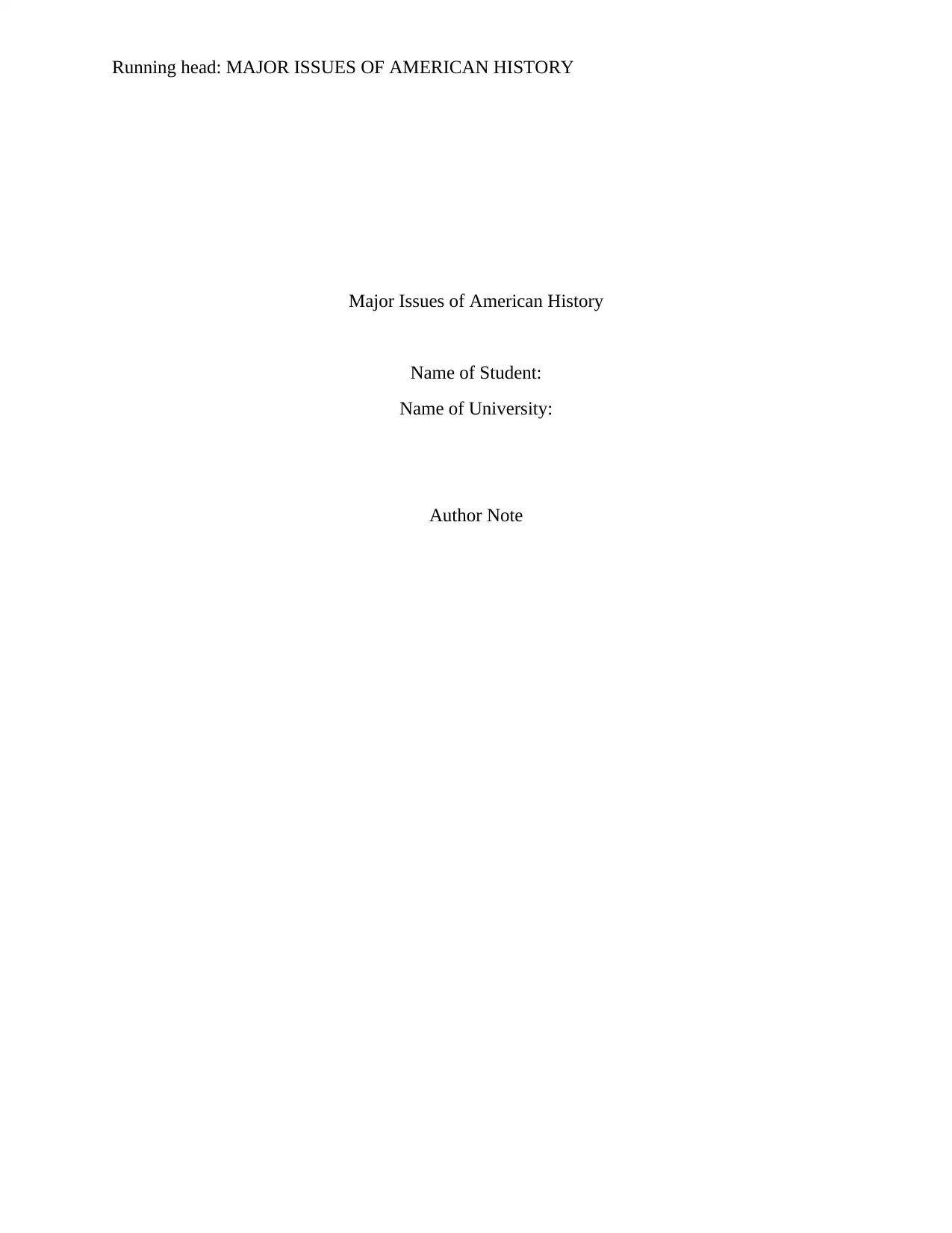
Running head: MAJOR ISSUES OF AMERICAN HISTORY
Major Issues of American History
Name of Student:
Name of University:
Author Note
Major Issues of American History
Name of Student:
Name of University:
Author Note
Paraphrase This Document
Need a fresh take? Get an instant paraphrase of this document with our AI Paraphraser
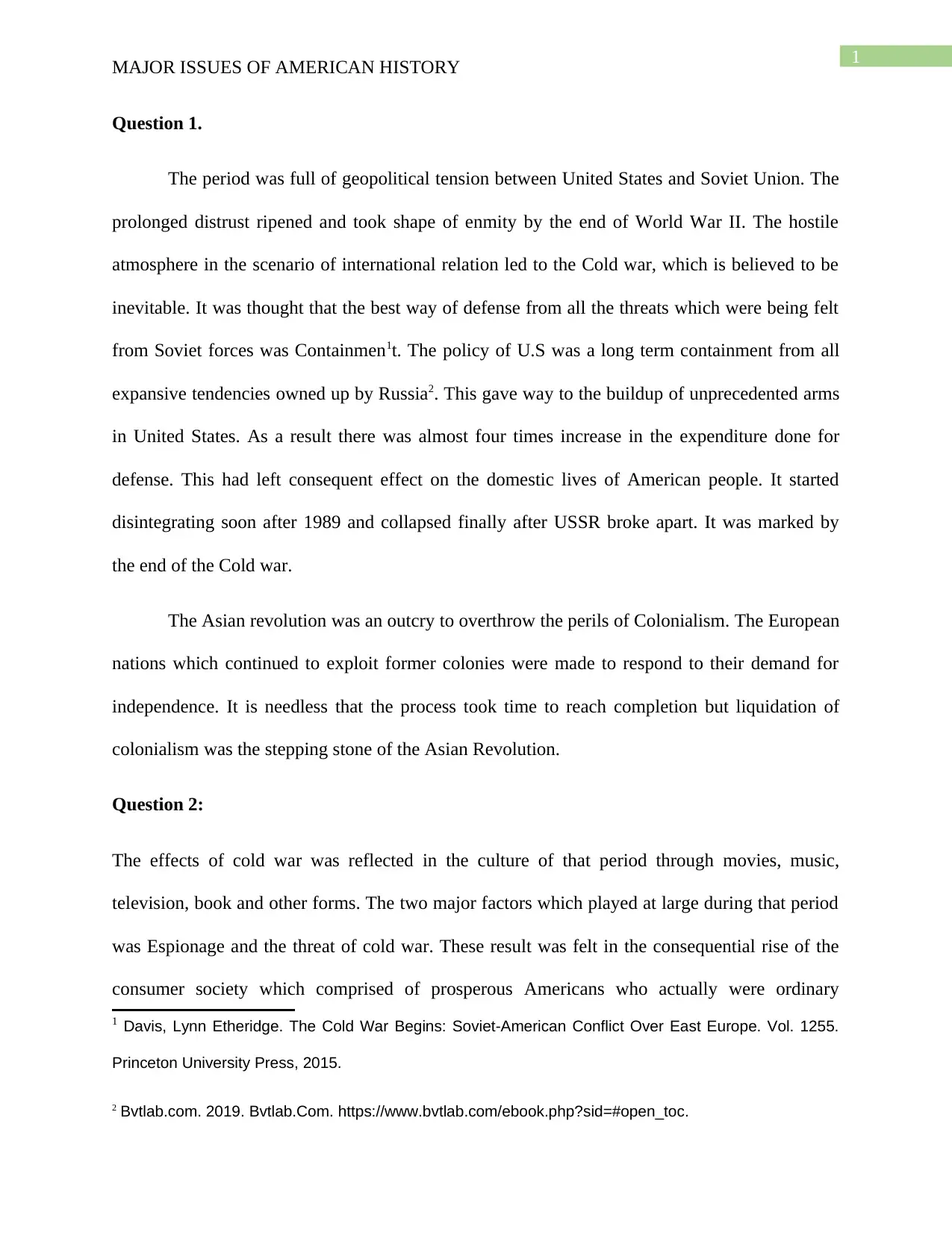
1
MAJOR ISSUES OF AMERICAN HISTORY
Question 1.
The period was full of geopolitical tension between United States and Soviet Union. The
prolonged distrust ripened and took shape of enmity by the end of World War II. The hostile
atmosphere in the scenario of international relation led to the Cold war, which is believed to be
inevitable. It was thought that the best way of defense from all the threats which were being felt
from Soviet forces was Containmen1t. The policy of U.S was a long term containment from all
expansive tendencies owned up by Russia2. This gave way to the buildup of unprecedented arms
in United States. As a result there was almost four times increase in the expenditure done for
defense. This had left consequent effect on the domestic lives of American people. It started
disintegrating soon after 1989 and collapsed finally after USSR broke apart. It was marked by
the end of the Cold war.
The Asian revolution was an outcry to overthrow the perils of Colonialism. The European
nations which continued to exploit former colonies were made to respond to their demand for
independence. It is needless that the process took time to reach completion but liquidation of
colonialism was the stepping stone of the Asian Revolution.
Question 2:
The effects of cold war was reflected in the culture of that period through movies, music,
television, book and other forms. The two major factors which played at large during that period
was Espionage and the threat of cold war. These result was felt in the consequential rise of the
consumer society which comprised of prosperous Americans who actually were ordinary
1 Davis, Lynn Etheridge. The Cold War Begins: Soviet-American Conflict Over East Europe. Vol. 1255.
Princeton University Press, 2015.
2 Bvtlab.com. 2019. Bvtlab.Com. https://www.bvtlab.com/ebook.php?sid=#open_toc.
MAJOR ISSUES OF AMERICAN HISTORY
Question 1.
The period was full of geopolitical tension between United States and Soviet Union. The
prolonged distrust ripened and took shape of enmity by the end of World War II. The hostile
atmosphere in the scenario of international relation led to the Cold war, which is believed to be
inevitable. It was thought that the best way of defense from all the threats which were being felt
from Soviet forces was Containmen1t. The policy of U.S was a long term containment from all
expansive tendencies owned up by Russia2. This gave way to the buildup of unprecedented arms
in United States. As a result there was almost four times increase in the expenditure done for
defense. This had left consequent effect on the domestic lives of American people. It started
disintegrating soon after 1989 and collapsed finally after USSR broke apart. It was marked by
the end of the Cold war.
The Asian revolution was an outcry to overthrow the perils of Colonialism. The European
nations which continued to exploit former colonies were made to respond to their demand for
independence. It is needless that the process took time to reach completion but liquidation of
colonialism was the stepping stone of the Asian Revolution.
Question 2:
The effects of cold war was reflected in the culture of that period through movies, music,
television, book and other forms. The two major factors which played at large during that period
was Espionage and the threat of cold war. These result was felt in the consequential rise of the
consumer society which comprised of prosperous Americans who actually were ordinary
1 Davis, Lynn Etheridge. The Cold War Begins: Soviet-American Conflict Over East Europe. Vol. 1255.
Princeton University Press, 2015.
2 Bvtlab.com. 2019. Bvtlab.Com. https://www.bvtlab.com/ebook.php?sid=#open_toc.
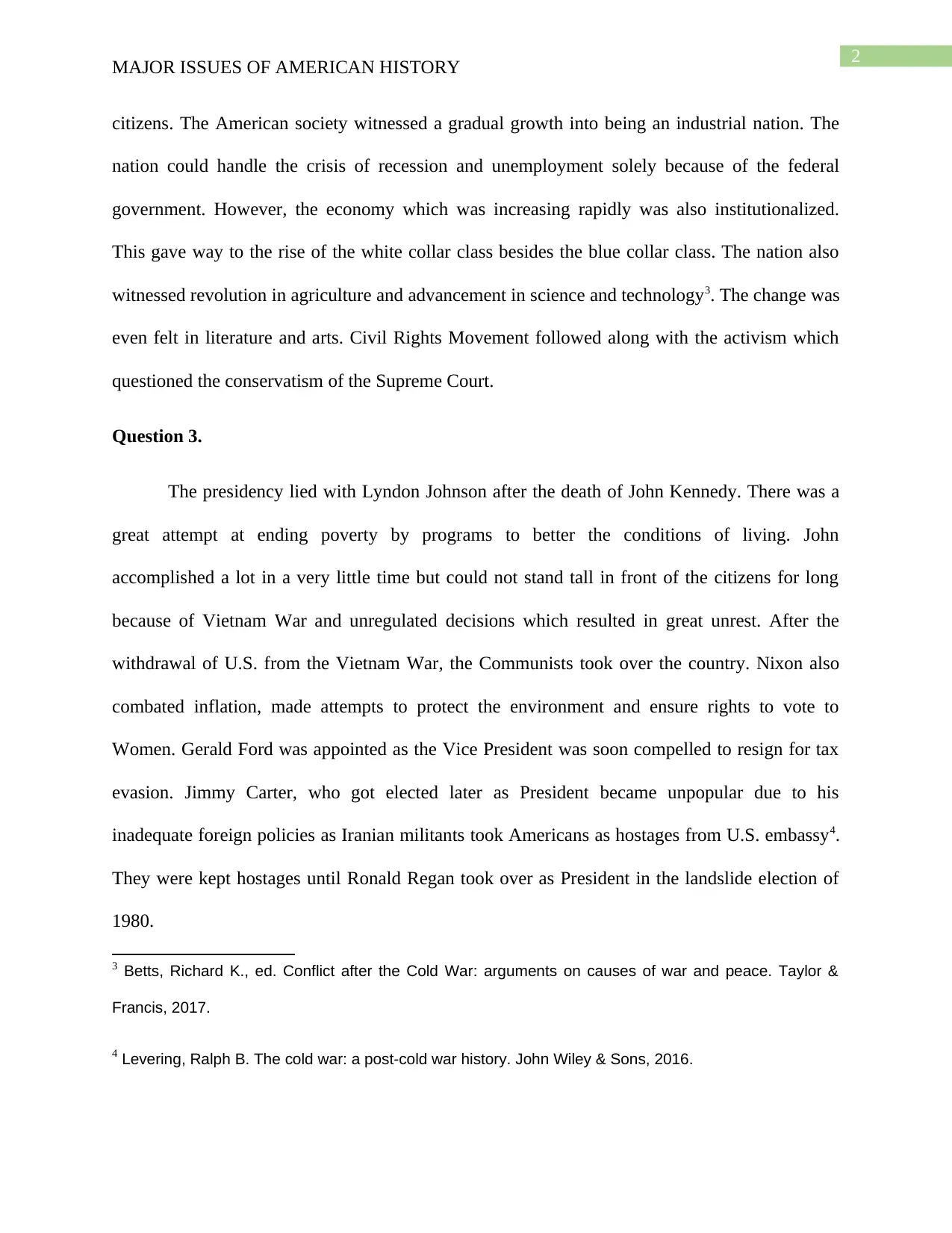
2
MAJOR ISSUES OF AMERICAN HISTORY
citizens. The American society witnessed a gradual growth into being an industrial nation. The
nation could handle the crisis of recession and unemployment solely because of the federal
government. However, the economy which was increasing rapidly was also institutionalized.
This gave way to the rise of the white collar class besides the blue collar class. The nation also
witnessed revolution in agriculture and advancement in science and technology3. The change was
even felt in literature and arts. Civil Rights Movement followed along with the activism which
questioned the conservatism of the Supreme Court.
Question 3.
The presidency lied with Lyndon Johnson after the death of John Kennedy. There was a
great attempt at ending poverty by programs to better the conditions of living. John
accomplished a lot in a very little time but could not stand tall in front of the citizens for long
because of Vietnam War and unregulated decisions which resulted in great unrest. After the
withdrawal of U.S. from the Vietnam War, the Communists took over the country. Nixon also
combated inflation, made attempts to protect the environment and ensure rights to vote to
Women. Gerald Ford was appointed as the Vice President was soon compelled to resign for tax
evasion. Jimmy Carter, who got elected later as President became unpopular due to his
inadequate foreign policies as Iranian militants took Americans as hostages from U.S. embassy4.
They were kept hostages until Ronald Regan took over as President in the landslide election of
1980.
3 Betts, Richard K., ed. Conflict after the Cold War: arguments on causes of war and peace. Taylor &
Francis, 2017.
4 Levering, Ralph B. The cold war: a post-cold war history. John Wiley & Sons, 2016.
MAJOR ISSUES OF AMERICAN HISTORY
citizens. The American society witnessed a gradual growth into being an industrial nation. The
nation could handle the crisis of recession and unemployment solely because of the federal
government. However, the economy which was increasing rapidly was also institutionalized.
This gave way to the rise of the white collar class besides the blue collar class. The nation also
witnessed revolution in agriculture and advancement in science and technology3. The change was
even felt in literature and arts. Civil Rights Movement followed along with the activism which
questioned the conservatism of the Supreme Court.
Question 3.
The presidency lied with Lyndon Johnson after the death of John Kennedy. There was a
great attempt at ending poverty by programs to better the conditions of living. John
accomplished a lot in a very little time but could not stand tall in front of the citizens for long
because of Vietnam War and unregulated decisions which resulted in great unrest. After the
withdrawal of U.S. from the Vietnam War, the Communists took over the country. Nixon also
combated inflation, made attempts to protect the environment and ensure rights to vote to
Women. Gerald Ford was appointed as the Vice President was soon compelled to resign for tax
evasion. Jimmy Carter, who got elected later as President became unpopular due to his
inadequate foreign policies as Iranian militants took Americans as hostages from U.S. embassy4.
They were kept hostages until Ronald Regan took over as President in the landslide election of
1980.
3 Betts, Richard K., ed. Conflict after the Cold War: arguments on causes of war and peace. Taylor &
Francis, 2017.
4 Levering, Ralph B. The cold war: a post-cold war history. John Wiley & Sons, 2016.
⊘ This is a preview!⊘
Do you want full access?
Subscribe today to unlock all pages.

Trusted by 1+ million students worldwide
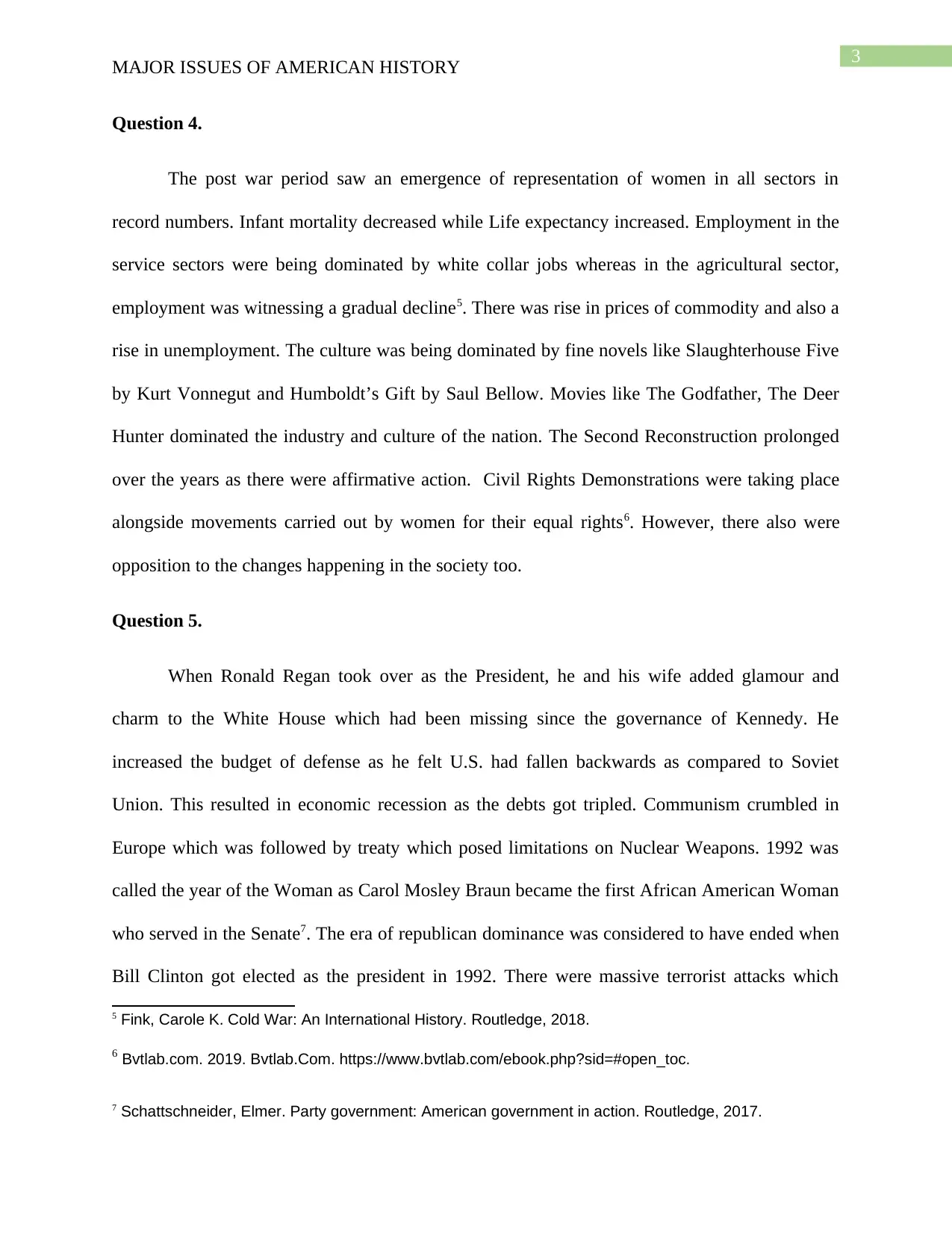
3
MAJOR ISSUES OF AMERICAN HISTORY
Question 4.
The post war period saw an emergence of representation of women in all sectors in
record numbers. Infant mortality decreased while Life expectancy increased. Employment in the
service sectors were being dominated by white collar jobs whereas in the agricultural sector,
employment was witnessing a gradual decline5. There was rise in prices of commodity and also a
rise in unemployment. The culture was being dominated by fine novels like Slaughterhouse Five
by Kurt Vonnegut and Humboldt’s Gift by Saul Bellow. Movies like The Godfather, The Deer
Hunter dominated the industry and culture of the nation. The Second Reconstruction prolonged
over the years as there were affirmative action. Civil Rights Demonstrations were taking place
alongside movements carried out by women for their equal rights6. However, there also were
opposition to the changes happening in the society too.
Question 5.
When Ronald Regan took over as the President, he and his wife added glamour and
charm to the White House which had been missing since the governance of Kennedy. He
increased the budget of defense as he felt U.S. had fallen backwards as compared to Soviet
Union. This resulted in economic recession as the debts got tripled. Communism crumbled in
Europe which was followed by treaty which posed limitations on Nuclear Weapons. 1992 was
called the year of the Woman as Carol Mosley Braun became the first African American Woman
who served in the Senate7. The era of republican dominance was considered to have ended when
Bill Clinton got elected as the president in 1992. There were massive terrorist attacks which
5 Fink, Carole K. Cold War: An International History. Routledge, 2018.
6 Bvtlab.com. 2019. Bvtlab.Com. https://www.bvtlab.com/ebook.php?sid=#open_toc.
7 Schattschneider, Elmer. Party government: American government in action. Routledge, 2017.
MAJOR ISSUES OF AMERICAN HISTORY
Question 4.
The post war period saw an emergence of representation of women in all sectors in
record numbers. Infant mortality decreased while Life expectancy increased. Employment in the
service sectors were being dominated by white collar jobs whereas in the agricultural sector,
employment was witnessing a gradual decline5. There was rise in prices of commodity and also a
rise in unemployment. The culture was being dominated by fine novels like Slaughterhouse Five
by Kurt Vonnegut and Humboldt’s Gift by Saul Bellow. Movies like The Godfather, The Deer
Hunter dominated the industry and culture of the nation. The Second Reconstruction prolonged
over the years as there were affirmative action. Civil Rights Demonstrations were taking place
alongside movements carried out by women for their equal rights6. However, there also were
opposition to the changes happening in the society too.
Question 5.
When Ronald Regan took over as the President, he and his wife added glamour and
charm to the White House which had been missing since the governance of Kennedy. He
increased the budget of defense as he felt U.S. had fallen backwards as compared to Soviet
Union. This resulted in economic recession as the debts got tripled. Communism crumbled in
Europe which was followed by treaty which posed limitations on Nuclear Weapons. 1992 was
called the year of the Woman as Carol Mosley Braun became the first African American Woman
who served in the Senate7. The era of republican dominance was considered to have ended when
Bill Clinton got elected as the president in 1992. There were massive terrorist attacks which
5 Fink, Carole K. Cold War: An International History. Routledge, 2018.
6 Bvtlab.com. 2019. Bvtlab.Com. https://www.bvtlab.com/ebook.php?sid=#open_toc.
7 Schattschneider, Elmer. Party government: American government in action. Routledge, 2017.
Paraphrase This Document
Need a fresh take? Get an instant paraphrase of this document with our AI Paraphraser
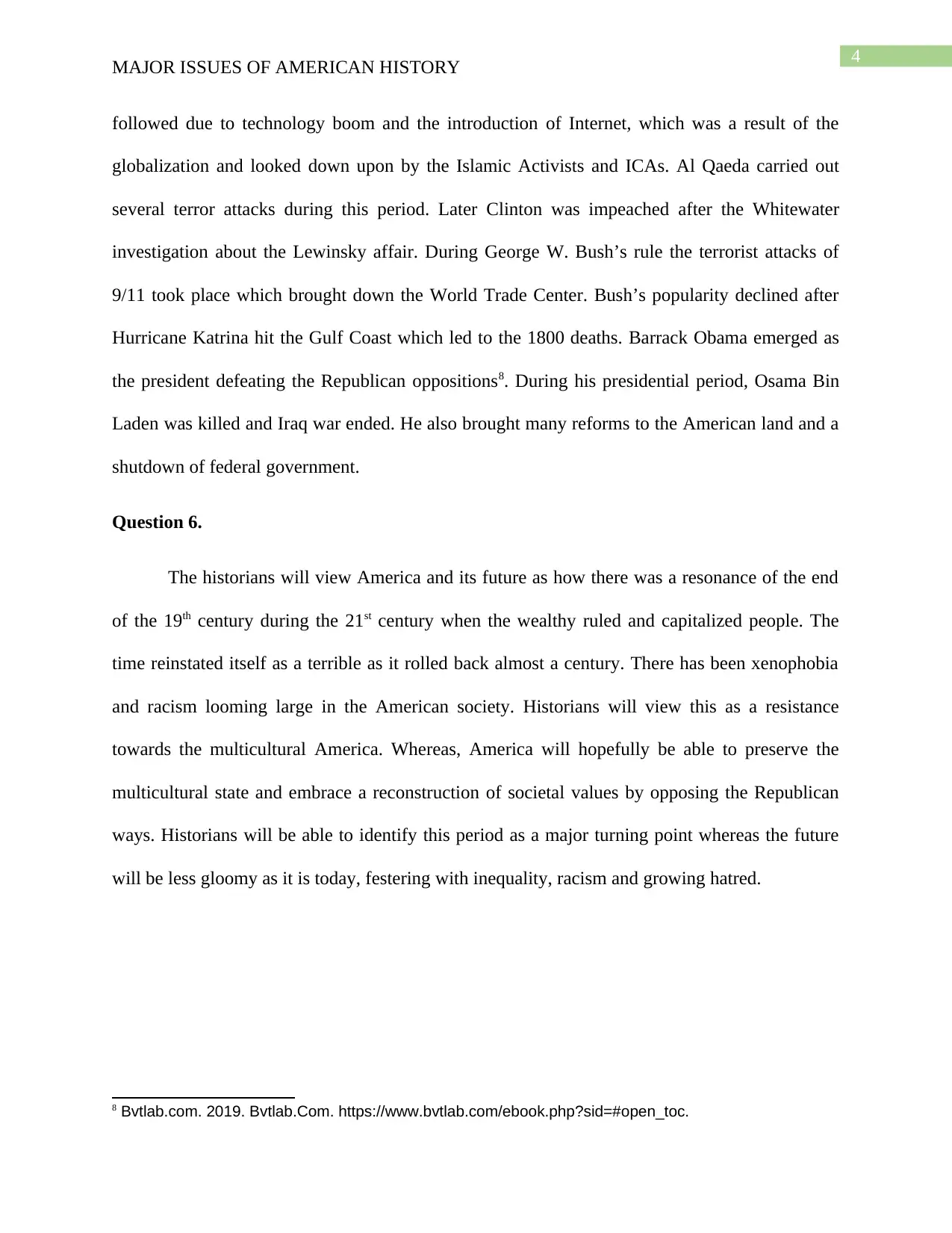
4
MAJOR ISSUES OF AMERICAN HISTORY
followed due to technology boom and the introduction of Internet, which was a result of the
globalization and looked down upon by the Islamic Activists and ICAs. Al Qaeda carried out
several terror attacks during this period. Later Clinton was impeached after the Whitewater
investigation about the Lewinsky affair. During George W. Bush’s rule the terrorist attacks of
9/11 took place which brought down the World Trade Center. Bush’s popularity declined after
Hurricane Katrina hit the Gulf Coast which led to the 1800 deaths. Barrack Obama emerged as
the president defeating the Republican oppositions8. During his presidential period, Osama Bin
Laden was killed and Iraq war ended. He also brought many reforms to the American land and a
shutdown of federal government.
Question 6.
The historians will view America and its future as how there was a resonance of the end
of the 19th century during the 21st century when the wealthy ruled and capitalized people. The
time reinstated itself as a terrible as it rolled back almost a century. There has been xenophobia
and racism looming large in the American society. Historians will view this as a resistance
towards the multicultural America. Whereas, America will hopefully be able to preserve the
multicultural state and embrace a reconstruction of societal values by opposing the Republican
ways. Historians will be able to identify this period as a major turning point whereas the future
will be less gloomy as it is today, festering with inequality, racism and growing hatred.
8 Bvtlab.com. 2019. Bvtlab.Com. https://www.bvtlab.com/ebook.php?sid=#open_toc.
MAJOR ISSUES OF AMERICAN HISTORY
followed due to technology boom and the introduction of Internet, which was a result of the
globalization and looked down upon by the Islamic Activists and ICAs. Al Qaeda carried out
several terror attacks during this period. Later Clinton was impeached after the Whitewater
investigation about the Lewinsky affair. During George W. Bush’s rule the terrorist attacks of
9/11 took place which brought down the World Trade Center. Bush’s popularity declined after
Hurricane Katrina hit the Gulf Coast which led to the 1800 deaths. Barrack Obama emerged as
the president defeating the Republican oppositions8. During his presidential period, Osama Bin
Laden was killed and Iraq war ended. He also brought many reforms to the American land and a
shutdown of federal government.
Question 6.
The historians will view America and its future as how there was a resonance of the end
of the 19th century during the 21st century when the wealthy ruled and capitalized people. The
time reinstated itself as a terrible as it rolled back almost a century. There has been xenophobia
and racism looming large in the American society. Historians will view this as a resistance
towards the multicultural America. Whereas, America will hopefully be able to preserve the
multicultural state and embrace a reconstruction of societal values by opposing the Republican
ways. Historians will be able to identify this period as a major turning point whereas the future
will be less gloomy as it is today, festering with inequality, racism and growing hatred.
8 Bvtlab.com. 2019. Bvtlab.Com. https://www.bvtlab.com/ebook.php?sid=#open_toc.
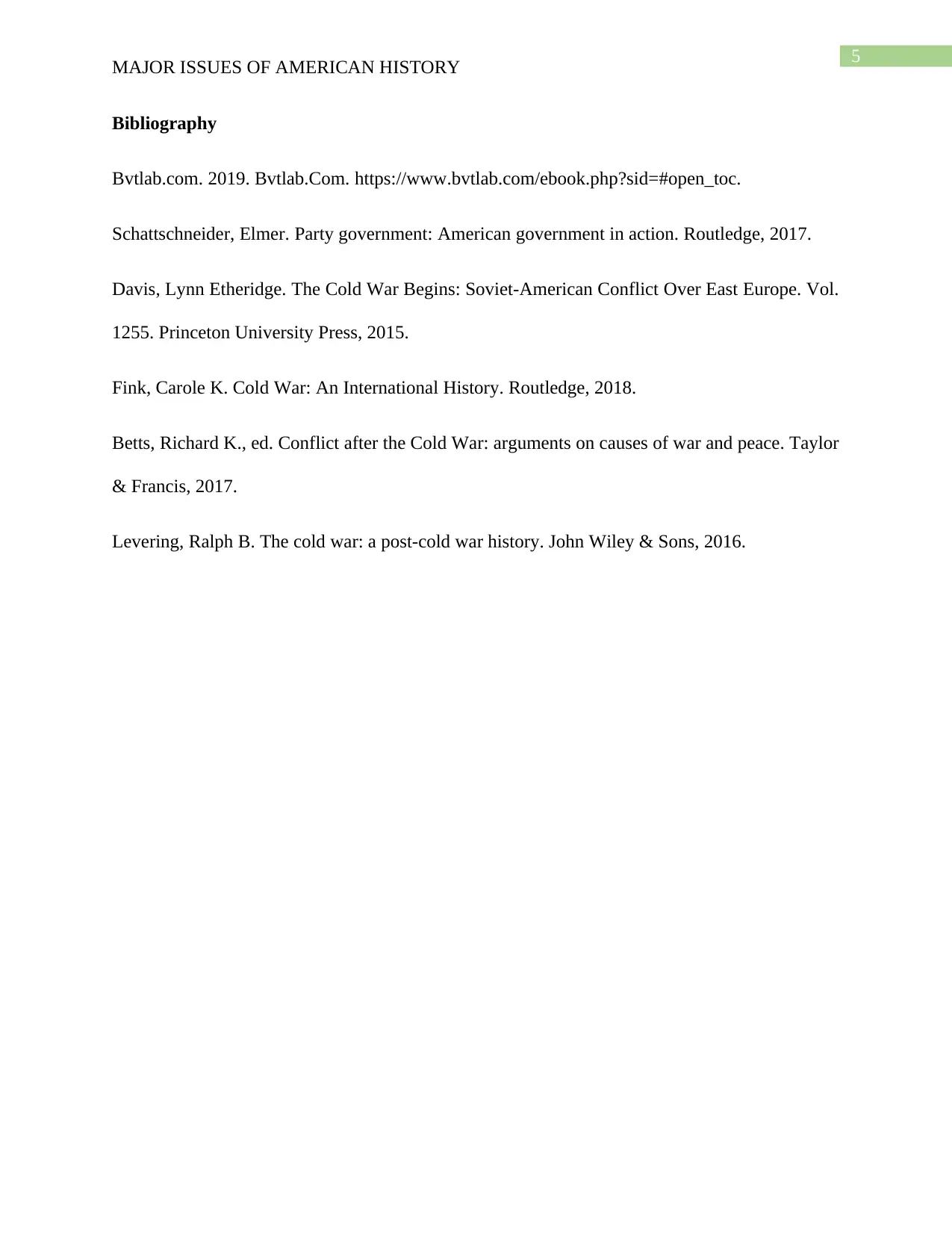
5
MAJOR ISSUES OF AMERICAN HISTORY
Bibliography
Bvtlab.com. 2019. Bvtlab.Com. https://www.bvtlab.com/ebook.php?sid=#open_toc.
Schattschneider, Elmer. Party government: American government in action. Routledge, 2017.
Davis, Lynn Etheridge. The Cold War Begins: Soviet-American Conflict Over East Europe. Vol.
1255. Princeton University Press, 2015.
Fink, Carole K. Cold War: An International History. Routledge, 2018.
Betts, Richard K., ed. Conflict after the Cold War: arguments on causes of war and peace. Taylor
& Francis, 2017.
Levering, Ralph B. The cold war: a post-cold war history. John Wiley & Sons, 2016.
MAJOR ISSUES OF AMERICAN HISTORY
Bibliography
Bvtlab.com. 2019. Bvtlab.Com. https://www.bvtlab.com/ebook.php?sid=#open_toc.
Schattschneider, Elmer. Party government: American government in action. Routledge, 2017.
Davis, Lynn Etheridge. The Cold War Begins: Soviet-American Conflict Over East Europe. Vol.
1255. Princeton University Press, 2015.
Fink, Carole K. Cold War: An International History. Routledge, 2018.
Betts, Richard K., ed. Conflict after the Cold War: arguments on causes of war and peace. Taylor
& Francis, 2017.
Levering, Ralph B. The cold war: a post-cold war history. John Wiley & Sons, 2016.
⊘ This is a preview!⊘
Do you want full access?
Subscribe today to unlock all pages.

Trusted by 1+ million students worldwide
1 out of 6
Related Documents
Your All-in-One AI-Powered Toolkit for Academic Success.
+13062052269
info@desklib.com
Available 24*7 on WhatsApp / Email
![[object Object]](/_next/static/media/star-bottom.7253800d.svg)
Unlock your academic potential
Copyright © 2020–2026 A2Z Services. All Rights Reserved. Developed and managed by ZUCOL.





